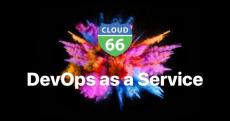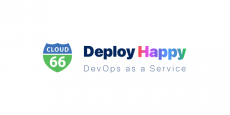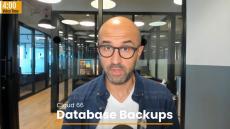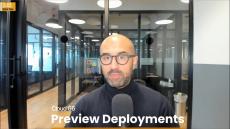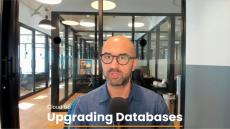|
By Vic van Gool
Announcing support for Ubuntu 24.04 LTS Noble Numbat on all Cloud 66 products (including registered servers). From this point onward, newly added servers will have Ubuntu 24.04 installed. Don't forget, you can control your target Ubuntu version via a selection dropdown when scaling up via the UI, or through your manifest! Ubuntu 24.04 is a Long-Term Support (LTS) release and will receive ongoing app updates and critical security fixes until June 2029.
|
By Julian Rubisch
Hotwire and Turbo have revolutionized how we build modern web applications with Ruby on Rails. By leveraging server-side rendering and minimizing JavaScript, Hotwire enables developers to create reactive, real-time user experiences without the complexity of a single-page application framework. This comprehensive guide will walk you through implementing Hotwire and Turbo in a Rails application from the ground up.
|
By Khash Sajadi
I love writing about features that take only a few sentences to introduce! Today, I am excited to tell you about Cloud 66 Secrets. Frankly, there is not much I can write about, because this is a feature that's easy to understand for all developers and we made it so easy to use that you will be up and running in minutes. But I'm going to try and write everything you might need to know about Cloud 66 Secrets here, so let's go!
|
By Khash Sajadi
Today I am very happy to announce the general availability of Blue Green and Canary releases for Kubernetes on Cloud 66. Allowing Blue Green and Canary releases for Kubernetes is the result of months of hard work by the team here at Cloud 66 and I am very pleased with the results. We wanted our Blue Green and Canary releases to be simple to use and I think we have found the sweet spot between flexibility and ease of use. Today we are also rolling out Preview deployments to GA for all our customers.
|
By Julian Rubisch
Feature flags are a way to affect how your application behaves at runtime, without having to deploy new code. As the name suggests, they can be used to switch certain features on or off depending on a specified rule. A type of feature flag you have probably already encountered can be implemented as simple environment variables. Consider the following code you typically find in every Rails app’s production.rb.
|
By Khash Sajadi
After AWS and DigitalOcean, Hetzner Cloud is the third popular cloud provider with our customers. At the time of writing, around 9% of our customers deploy their applications on Hetzner. Our customers love their simple and straight forward product and pricing as well as their affordable bare-metal options. Over the past few months, many of our Hetzner customers reached out to us with complains of deployment failures.
|
By Khash Sajadi
Friends of this blog know that I am a big fan of building internal tools, or as we call them, "tools that help scale people". As the name suggests, internal tools are used, well, internally and as such usually will require their access to be restricted to the company's staff and network. In the past, I've written about how to use Tailscale for authentication of internal tools using HTTP. In this post, I will show you how to use Tailscale for gRPC authentication in Golang.
|
By Khash Sajadi
Today we have rolled out a change in the way you can configure each deployment of your application. Normally you deploy your apps, using the Deploy button on the top right corner of your application page. This will deploy your application based on the "default" Deployment Profile. You can also customize your deployment, using the "Deploy with Options" item on the deploy menu. With today's rollout, we've made improvements to this flow.
|
By Julian Rubisch
This blog post aims to dissect the various deployment options available for Rails applications in 2024, emphasizing the choice between native and containerized approaches. It dives into the advantages and drawbacks of each method and explores the hosting options available for each. Let’s dive right in!
|
By Khash Sajadi
Amazon Simple Email Service (SES) is a cost-effective email service provided by AWS. It is by far the cheapest option available out there. Comparing the cost of sending emails with SES and other services like SendGrid or Mailchimp, it can be 100x cheaper. However there is a catch. Using SES directly, you will not get some of the features you might need to control the bounce rate of your emails.
|
By Cloud 66
Application Groups are arbitrary collections of your applications that can be deployed simultaneously. Groups are not mutually exclusive - applications can exist in more than one group. What is Cloud 66? Cloud 66 gives you everything you need to build, deploy and maintain your applications on any cloud, without the headache of dealing with “server stuff”. Useful links.
|
By Cloud 66
A failover group is a managed, quick-response DNS address that automatically follows your application's web endpoints. You can connect it to up to two instances of an application at any time - a primary and backup instance. Should you need to switch traffic between your instances, you can flip a switch and your traffic will begin flowing to the backup instance within 5 minutes. What is Cloud 66? Cloud 66 gives you everything you need to build, deploy and maintain your applications on any cloud, without the headache of dealing with “server stuff”.
|
By Cloud 66
Cloud 66 supports two types of backups: managed and unmanaged. Managed backups: Using managed backups has several benefits: The 100 most recent managed backups are kept by default. Unmanaged backups: Unmanaged backups are stored on your local server and are available under `/var/cloud66/backups`. The 10 most recent unmanaged backups are kept by default. We don’t charge for unmanaged backups. What is Cloud 66? Cloud 66 gives you everything you need to build, deploy and maintain your applications on any cloud, without the headache of dealing with “server stuff”.
|
By Cloud 66
Database replication involves configuring a master and replica database architecture, whereby the replica is an exact copy of the master at all times. This feature is supported for MySQL, PostgreSQL, Redis and MongoDB. Database replication can be set up for a single application, between applications, or between database groups. What is Cloud 66? Cloud 66 gives you everything you need to build, deploy and maintain your applications on any cloud, without the headache of dealing with “server stuff”.
|
By Cloud 66
Cloud 66 offers a range of deployment options for your applications: And there are also two types of Rollouts strategies available: What is Cloud 66? Cloud 66 gives you everything you need to build, deploy and maintain your applications on any cloud, without the headache of dealing with “server stuff”.
|
By Cloud 66
What are Preview Deployments? Preview Deployments automatically build and deploy a (private) preview version of your application whenever you commit changes to your repo. The preview runs alongside your active application and helps you to quickly test changes to your code without having to deploy to a separate environment. What is Cloud 66? Cloud 66 gives you everything you need to build, deploy and maintain your applications on any cloud, without the headache of dealing with “server stuff”.
|
By Cloud 66
Cloud 66 will not do in-place database upgrades, because this process may cause your application to stop working or may not be possible automatically. To upgrade your database through Cloud 66, we recommend that you create a new application (at which point Cloud 66 will deploy the newer database version). Once the new application is created, you can migrate data from your old application to your new application.
|
By Cloud 66
LiveLogs is Cloud 66’s real-time logging interface. It allows you to monitor your app via the Cloud 66 Dashboard. You can set up custom Live Logs via your Manifest file. What is Cloud 66? Cloud 66 gives you everything you need to build, deploy and maintain your applications on any cloud, without the headache of dealing with “server stuff”.
|
By Cloud 66
Cloud 66 aims to make it easier to build immutable infrastructure. Building servers and applications from scratch is much better than modifying existing server configurations and tinkering with settings until things start to work.
|
By Cloud 66
Traffic consist of one or more functions that run in a sequence. They run from top to bottom and affect the route that each web request to your application takes. They can also block traffic based on different conditions. If traffic is blocked, it will not run through the rest of the rules that come after the current one. What is Cloud 66? Cloud 66 gives you everything you need to build, deploy and maintain your applications on any cloud, without the headache of dealing with “server stuff”.
- November 2024 (1)
- October 2024 (2)
- June 2024 (3)
- March 2024 (2)
- December 2023 (1)
- October 2023 (1)
- September 2023 (2)
- August 2023 (1)
- July 2023 (1)
- June 2023 (1)
- April 2023 (4)
- February 2023 (1)
- January 2023 (3)
- December 2022 (3)
- November 2022 (11)
- October 2022 (2)
- August 2022 (1)
- July 2022 (1)
- June 2022 (4)
- May 2022 (5)
- April 2022 (4)
- March 2022 (6)
- February 2022 (4)
- January 2022 (5)
- December 2021 (2)
- November 2021 (1)
- October 2021 (10)
- September 2021 (3)
- August 2021 (5)
- July 2021 (2)
- June 2021 (3)
- May 2021 (1)
- April 2021 (2)
- March 2021 (3)
- February 2021 (2)
- December 2020 (1)
Cloud 66 helps developers to deploy code, directly from the repository to their own servers on any cloud.
Discover Cloud 66 products:
- Cloud 66 for Rails - allows developers to deploy and manage Rails, Sinatra, and other Rack-based applications on any cloud.
- Cloud 66 Maestro - offers a full-stack container management service backed up by Kubernetes. You can deploy any application (any language, any framework) to any cloud, as long as you have a Dockerfile.
- Cloud 66 Prepress - builds and deploys pre-rendered, JAMStack applications (Jekyll, Hugo, or Gatsby) on your own cloud.
From commit to production in minutes. Getting started:
- Connect your Git repository. We will analyze your code and automatically suggest the best configuration for you.
- Connect your cloud provider or server. We are natively integrated with AWS, DigitalOcean, Hetzner, Linode, Microsoft Azure, Google Cloud, Vultr, OVH cloud and Maxihost. Or bring your own server and we'll provision it for you.
- Deploy! Once your application is deployed take the advantage of our features to enhance your application.
Features:
- Provision — builds your infrastructure straight from your code.
- Deployment — supports rolling, parallel, blue/green and canary deployment strategies and full deployment history with easy rollbacks.
- Databases - supports MySQL, PostgreSQL, MongoDB, Redis, ElasticSearch, Memcached & RabbitMQ deployment, backups and replication on your own servers.
- Security — provides simple firewall management, stress-free DDoS protection and powerful account security tools.
- Scaling — cloud load balancing, worker process management and horizontal scaling on any cloud.
- Teams — unlimited team members at no extra cost, with fine-grained control over permissions and roles. Multi-organization support.
Cloud 66 products help companies build, deploy and manage their applications without hiring DevOps teams.


